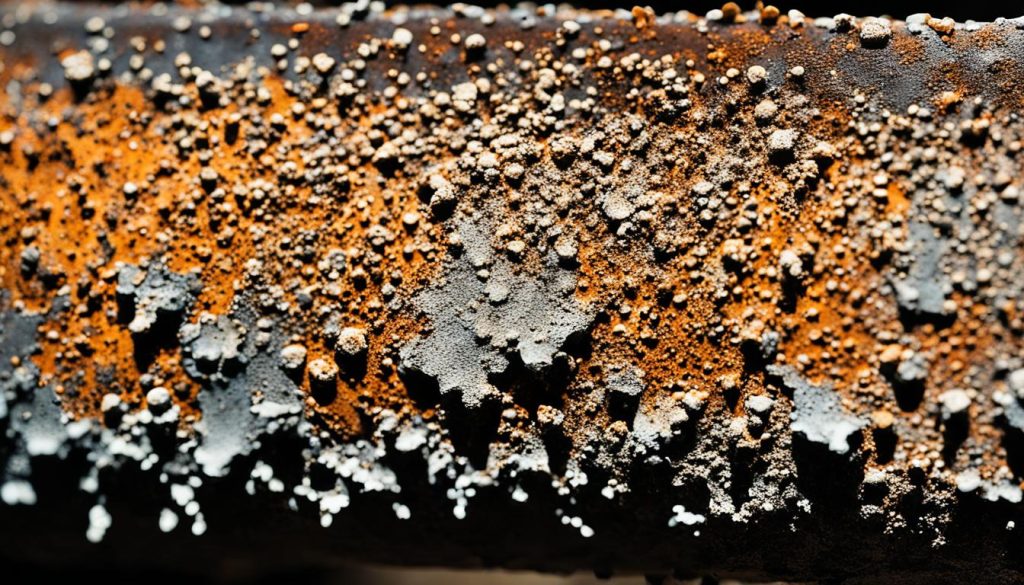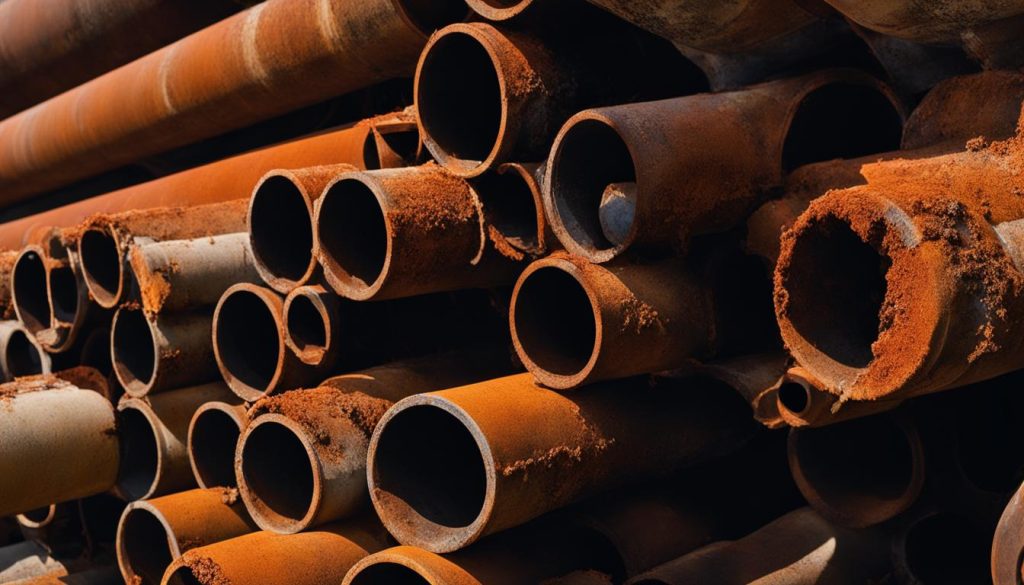Solve Rusty Plumbing Issues With Expert Tips
Did you know that rusty plumbing can cause leaks and even health hazards? Rust is a common problem in plumbing pipes and appliances, and it can lead to costly repairs and potential water damage. But don’t worry, I’m here to help you tackle this issue head-on with some expert tips.
Key Takeaways:
- Preventing rust is crucial to maintaining a healthy plumbing system.
- Using a water softener and regular cleaning can help prevent rust buildup.
- Sealing pipes and appliances can prevent moisture and rust formation.
- Removing rust can be done using household items like vinegar, baking soda, and lemon juice.
- For severe cases, calling a plumbing specialist is recommended.
Preventing Rust in Plumbing Pipes and Appliances.
Preventing rust in your plumbing pipes and appliances is essential to maintain their longevity and functionality. By taking proactive measures, you can effectively prevent rust buildup and avoid costly repairs down the line.
A common cause of rust in plumbing is hard water, which contains minerals like calcium and magnesium. To combat this, using a water softener is highly recommended. A water softener removes these minerals, preventing them from causing rust.
Regular cleaning is also crucial in rust prevention. Clean your pipes and appliances regularly using a gentle, non-abrasive cleaner. This will help remove any dirt or grime that could lead to rust formation. Additionally, consider using a rust inhibitor product to provide an extra layer of protection against rust.
Another important step in preventing rust is to seal any cracks or openings in your pipes and appliances. Moisture can easily seep in through these openings and lead to rust formation. By sealing these areas, you can effectively prevent moisture from causing rust.
Monitoring your water pressure is also key in rust prevention. Excessive water pressure can put unnecessary strain on your plumbing system, leading to rust formation. It’s important to monitor and adjust the water pressure to maintain optimal conditions for your pipes and appliances.
Lastly, consider upgrading to stainless steel pipes and appliances. Stainless steel is highly resistant to rust and corrosion, making it a durable and long-lasting option for your plumbing needs.
To summarize, here are the key steps to prevent rust in your plumbing pipes and appliances:
- Use a water softener to remove minerals from hard water.
- Clean your pipes and appliances regularly with a gentle cleaner.
- Use a rust inhibitor product for added protection.
- Seal cracks and openings to prevent moisture from causing rust.
- Monitor and adjust water pressure to avoid strain on your plumbing system.
- Consider upgrading to stainless steel pipes and appliances for long-term rust prevention.
Removing Rust from Plumbing Metals.
When it comes to removing rust from plumbing appliances, there are several effective methods you can try. These methods include using a vinegar solution, baking soda, lemon juice, or commercial rust removers. Let’s dive deeper into each of these options.
Vinegar Solution
A vinegar solution is a simple and affordable way to remove rust from plumbing metals. To use this method, create a solution of equal parts vinegar and water. Then, soak the rusted area in the solution for a few hours or overnight. After soaking, scrub the area with a sponge or brush to remove the rust. Vinegar’s acidic properties help dissolve the rust, making it easier to scrub away.
Baking Soda
Baking soda is another effective and gentle rust remover. Create a paste by mixing baking soda with water until it forms a thick consistency. Apply the paste to the rusted areas and let it sit for a few hours. Then, scrub the area with a sponge or brush to remove the rust. Baking soda acts as a mild abrasive, helping to lift the rust stains without damaging the plumbing metals.
Lemon Juice
Lemon juice is a natural rust remover that can be applied directly to the rusted areas. The citric acid in lemon juice helps break down the rust, making it easier to remove. Squeeze fresh lemon juice onto the rusted areas and let it sit for a few hours. Then, scrub the area with a sponge or brush to remove the rust. Lemon juice not only removes rust but also leaves a refreshing citrus scent behind.
Commercial Rust Removers
In severe cases of rust, commercial rust removers can be used as a last resort. These products are specifically designed to tackle tough rust stains. Before using a commercial rust remover, carefully read and follow the instructions provided on the container. It’s important to take necessary precautions, such as wearing gloves and working in a well-ventilated area. Commercial rust removers are generally effective at removing stubborn rust stains.
With these various methods at your disposal, you can effectively remove rust from plumbing metals and restore their appearance. Whether you choose to use a vinegar solution, baking soda, lemon juice, or a commercial rust remover, remember to take proper safety precautions and follow the instructions for best results.
Dealing With Rusty Water Pipes.
If you’re finding rusty water coming out of your taps, it’s essential to identify the source of the problem, whether it’s within your home plumbing system or the public water supply. Conducting a simple test by collecting samples of cold and hot water can help determine the cause.
If the rusty water is only present in one tap or clears after running water for a few seconds, it’s likely a problem within your home plumbing system. This could be due to corrosion in the pipes or a rusty water heater. In such cases, it is advisable to call a licensed plumber for further investigation.
If the rusty water is present in all taps and doesn’t improve, it may indicate a larger issue with the public water supply. Contacting your local water utility provider can help you verify if there are any ongoing maintenance or repair activities that might be causing the rusty water supply. If it is a persistent problem, they may need to inspect and address the issue.
How to Determine the Source of Rusty Water
To identify whether the rusty water is coming from your home plumbing system or the public water supply, follow these steps:
- Turn on both cold and hot water taps in multiple locations throughout your home.
- Let the water run for a few minutes to ensure any stagnant water is flushed out.
- Collect a sample of water in a clear container from different taps.
- Inspect the water for any signs of rust particles or discoloration.
By comparing the collected samples, you can determine if the rusty water issue is localized to your home’s plumbing or is a broader problem involving the public water supply.
Potential Solutions for Rusty Water Pipes
If the issue is identified within your home plumbing system, it may be necessary to replace the affected pipes or address any corrosion in the water heater. Consult with a professional plumber to assess the extent of the damage and determine the most suitable course of action.
For severe cases, a table below summarizes the potential solutions for dealing with rusty water pipes and water heater rusting:
| Rusty Water Pipes | Water Heater Rusting |
|---|---|
| Inspect the plumbing system for leaks or corrosion | Consult a licensed plumber for assessment and possible replacement |
| Consider replacing rusty pipes with newer materials such as copper or PEX | Replace the water heater unit if corrosion is extensive |
| Flush the plumbing system by running water for an extended period | Regularly maintain and replace the anode rod in the water heater |
| Install a whole-house water filtration system to minimize future corrosion | Monitor water heater condition and schedule professional maintenance |
Remember, addressing rust-related issues promptly can help prevent further damage to your plumbing system and ensure a clean and reliable water supply.
Replacing Rusty Pipes and Water Heaters.
If you’re dealing with rusty pipes in your home plumbing system, it’s crucial to replace them as soon as possible to prevent further damage and potential leaks. Rusty pipes can weaken over time, leading to costly repairs and even water damage to your property.
To tackle this issue, I recommend reaching out to a qualified plumber who can assess the extent of the rust and develop a customized plan for pipe replacement. They have the expertise and necessary tools to ensure the new pipes are installed correctly and efficiently.
In some cases, the source of rust may be a corroded water heater. When the tank of the water heater starts to rust, it’s a sign that the entire unit needs to be replaced. Continuing to use a rusted water heater can lead to more severe damage and even potential hazards.
When replacing a water heater, it’s essential to consider factors such as efficiency, capacity, and energy-saving features. Investing in a high-quality water heater replacement will not only provide you with clean and rust-free hot water but also save you money in the long run.
One important aspect to consider for water heater maintenance is the anode rod. The anode rod is a sacrificial metal rod that helps prevent corrosion in the tank. Over time, the anode rod gets depleted and needs to be replaced. Regularly replacing the anode rod can significantly extend the life of your water heater and prevent corrosion-related issues.
Now, let’s take a look at a comparison table that showcases the benefits of replacing rusty pipes and water heaters:
| Benefits of Replacing Rusty Pipes | Benefits of Replacing Water Heaters |
|---|---|
|
|
By replacing rusty pipes and water heaters, you can ensure the long-term durability and efficiency of your home’s plumbing system. Don’t hesitate to consult with a professional plumber to assess your specific needs and guide you through the replacement process.
Getting Professional Assistance for Rusty Water Issues.
If you are dealing with rusty water or experiencing other rusty plumbing issues, it is crucial to seek the help of a professional plumber. They have the expertise and knowledge to conduct a thorough investigation and find the root cause of the problem.
A professional plumber can identify whether the rust is originating from your home plumbing system or if it is a result of issues within the public water supply. Once they have determined the source, they can provide appropriate solutions tailored to your specific situation.
Whether it requires pipe replacement or water heater maintenance, a professional plumber will have the necessary skills and equipment to fix the problem effectively. Benjamin Franklin Plumbing is a highly regarded plumbing service that specializes in tackling rusty water issues. They have a team of experienced plumbers who are dedicated to providing top-notch plumbing services to ensure your water runs clear and free from rust.
Source Links
- https://www.mrrooter.com/southeast-georgia/about-us/blog/a-guide-to-preventing-and-removing-rust-from-plumbing-pipes-and-appliances/
- https://www.benjaminfranklinplumbing.com/expert-tips/faucets/when-rusty-water-appears-find-the-source-fast/
- https://www.plumbingparamedics.ca/rusty-pipes/
- Investing Wisely: How Windows & Doors in Boost Property Value and Financial Health - April 24, 2025
- The Financial Impact of Personal Injuries: Why Legal Help Matters for Business Owners - April 16, 2025
- The Hidden Financial Costs of Domestic Assault: What Business Owners Need to Know - April 16, 2025













